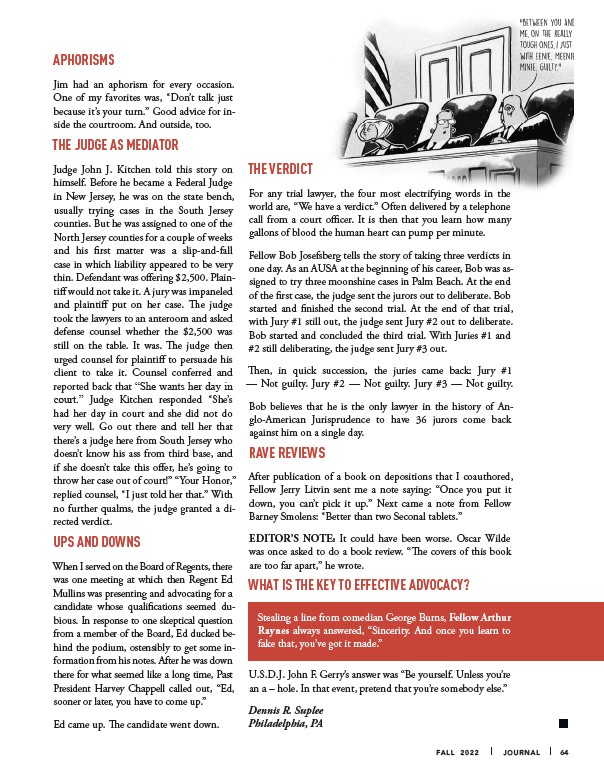
APHORISMS
Jim had an aphorism for every occasion.
One of my favorites was, “Don’t talk just
because it’s your turn.” Good advice for inside
the courtroom. And outside, too.
THE JUDGE AS MEDIATOR
Judge John J. Kitchen told this story on
himself. Before he became a Federal Judge
in New Jersey, he was on the state bench,
usually trying cases in the South Jersey
counties. But he was assigned to one of the
North Jersey counties for a couple of weeks
and his first matter was a slip-and-fall
case in which liability appeared to be very
thin. Defendant was offering $2,500. Plaintiff
would not take it. A jury was impaneled
and plaintiff put on her case. The judge
took the lawyers to an anteroom and asked
defense counsel whether the $2,500 was
still on the table. It was. The judge then
urged counsel for plaintiff to persuade his
client to take it. Counsel conferred and
reported back that “She wants her day in
court.” Judge Kitchen responded “She’s
had her day in court and she did not do
very well. Go out there and tell her that
there’s a judge here from South Jersey who
doesn’t know his ass from third base, and
if she doesn’t take this offer, he’s going to
throw her case out of court!” “Your Honor,”
replied counsel, “I just told her that.” With
no further qualms, the judge granted a directed
verdict.
UPS AND DOWNS
When I served on the Board of Regents, there
was one meeting at which then Regent Ed
Mullins was presenting and advocating for a
candidate whose qualifications seemed dubious.
In response to one skeptical question
from a member of the Board, Ed ducked behind
the podium, ostensibly to get some information
from his notes. After he was down
there for what seemed like a long time, Past
President Harvey Chappell called out, “Ed,
sooner or later, you have to come up.”
Ed came up. The candidate went down.
THE VERDICT
For any trial lawyer, the four most electrifying words in the
world are, “We have a verdict.” Often delivered by a telephone
call from a court officer. It is then that you learn how many
gallons of blood the human heart can pump per minute.
Fellow Bob Josefsberg tells the story of taking three verdicts in
one day. As an AUSA at the beginning of his career, Bob was assigned
to try three moonshine cases in Palm Beach. At the end
of the first case, the judge sent the jurors out to deliberate. Bob
started and finished the second trial. At the end of that trial,
with Jury #1 still out, the judge sent Jury #2 out to deliberate.
Bob started and concluded the third trial. With Juries #1 and
#2 still deliberating, the judge sent Jury #3 out.
Then, in quick succession, the juries came back: Jury #1
— Not guilty. Jury #2 — Not guilty. Jury #3 — Not guilty.
Bob believes that he is the only lawyer in the history of Anglo
American Jurisprudence to have 36 jurors come back
against him on a single day.
RAVE REVIEWS
After publication of a book on depositions that I coauthored,
Fellow Jerry Litvin sent me a note saying: “Once you put it
down, you can’t pick it up.” Next came a note from Fellow
Barney Smolens: “Better than two Seconal tablets.”
EDITOR’S NOTE: It could have been worse. Oscar Wilde
was once asked to do a book review. “The covers of this book
are too far apart,” he wrote.
WHAT IS THE KEY TO EFFECTIVE ADVOCACY?
Stealing a line from comedian George Burns, Fellow Arthur
Raynes always answered, “Sincerity. And once you learn to
fake that, you’ve got it made.”
U.S.D.J. John F. Gerry’s answer was “Be yourself. Unless you’re
an a – hole. In that event, pretend that you’re somebody else.”
Dennis R. Suplee
Philadelphia, PA
FALL 2022 JOURNAL 64